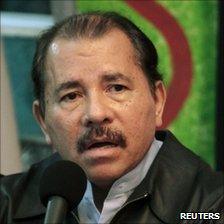Nicaragua accused of 'failing rape victims'
- Published

The government of President Ortega has not responded to the report
Authorities in Nicaragua are failing to tackle high levels of sexual violence against girls, rights group Amnesty International says in a report.
Two-thirds of rape victims in Nicaragua are under the age of 17, it says.
In addition, negative social attitudes inhibit victims from speaking out about their ordeal, Amnesty says.
The group calls on Nicaragua to make clear that sexual violence is never the fault of the victim, and perpetrators will be brought to justice.
In a report published to mark the international day for the elimination of violence against women, Amnesty says survivors of sexual abuse in Nicaragua are often stigmatised by the authorities and society alike.
The group says most perpetrators are relatives or people in positions of power, and that many girls are put under pressure to remain silent.
The report quotes one young woman who said she was 17 when she was raped by a a member of her family and became pregnant.
She said several people, including the local priest, pressured her not to file a complaint and to give the baby up for adoption.
Silent trauma
In another case, Amnesty says a mother who reported that her daughter was being raped by her partner (the girl's step-father) was was jailed for 12 years for complicity for not reporting the crime earlier.
No efforts were made to arrest the alleged rapist.
"Every day girls in Nicaragua are suffering the horror of sexual violence in silence, rather than risk the rejection that many suffer when they speak out", said Amnesty's Nicaragua researcher Esther Major.
"Young victims of rape and sexual abuse demand that their right to be free from sexual violence is protected by the Nicaraguan government, and that they are supported so they can overcome the physical and psychological trauma caused by such acts of violence", she said.
Amnesty adds that Nicaragua's law on abortion means rape victims who get pregnant must have the baby or face imprisonment.
There has been no response to the report so far from the Nicaraguan government.
In 1998 the current Nicaraguan President Daniel Ortega was accused by his adopted step-daughter, Zoilamerica Narvaez, of sexually abusing her from the age of 11 to 22.
He strongly denied the allegations, and the case was never brought to trial because of Nicaragua's statute of limitations and Mr Ortega's immunity from prosecution as a member of parliament.